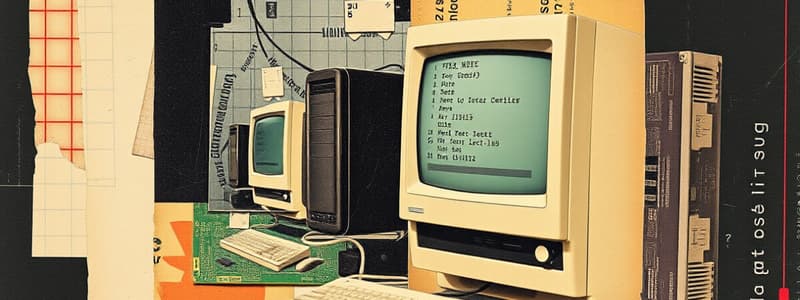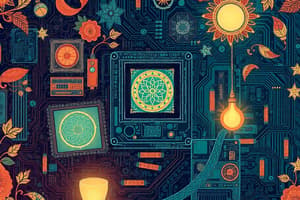Podcast
Questions and Answers
What is considered to be a basic component of a computer system?
What is considered to be a basic component of a computer system?
- Operating System
- Data Bus (correct)
- Power Supply (correct)
- Network Interface (correct)
Which of the following best describes the role of an Operating System?
Which of the following best describes the role of an Operating System?
- To manage hardware resources and provide a user interface (correct)
- To execute applications directly without hardware intervention
- To enhance the performance of the computer by reducing hardware use
- To ensure network security and connectivity
Which statement accurately reflects a primary evolution of computer systems?
Which statement accurately reflects a primary evolution of computer systems?
- Computer systems have mostly remained static in their design.
- Computer systems have uniformly increased in physical size over time.
- All computer systems have transitioned from analog to digital.
- The functionality of computer systems has become more integrated and compact. (correct)
In what way does the evolution of computer systems impact the role of an Operating System?
In what way does the evolution of computer systems impact the role of an Operating System?
Which component is NOT classified as a basic element of a computer system?
Which component is NOT classified as a basic element of a computer system?
What is the primary function of an Operating System in a computer system?
What is the primary function of an Operating System in a computer system?
How did the evolution of computer systems primarily influence user interaction?
How did the evolution of computer systems primarily influence user interaction?
Which of the following is NOT considered a fundamental component of a computer system?
Which of the following is NOT considered a fundamental component of a computer system?
Which statement best illustrates the role of an Operating System in managing software applications?
Which statement best illustrates the role of an Operating System in managing software applications?
Which change is associated with the evolution of computer systems?
Which change is associated with the evolution of computer systems?
Flashcards are hidden until you start studying
Study Notes
Evolution of Computer Systems
- Computer systems have evolved from large, room-sized machines to compact devices, driven by advances in technology.
- Generations of computers are categorized based on technology: vacuum tubes, transistors, integrated circuits, and microprocessors.
- Significant milestones include the development of the first programmable computer (Z3, 1941), the introduction of personal computers (1970s), and the rise of mobile computing (2000s).
- Current trends focus on artificial intelligence, quantum computing, and the Internet of Things (IoT), indicating a shift towards smart, interconnected devices.
Basic Components of a Computer System
- Core components include the central processing unit (CPU), memory (RAM), storage (HDD/SSD), and input/output devices.
- The CPU, often referred to as the brain of the computer, processes instructions and performs calculations.
- RAM acts as temporary storage for data and programs in use, enabling quick access and processing.
- Storage devices hold data permanently, with HDD offering higher capacity and SSD providing faster access speeds.
- Input devices (e.g., keyboard, mouse) facilitate interaction with the computer, while output devices (e.g., monitors, printers) deliver information to the user.
Role of an Operating System
- The operating system (OS) manages hardware and software resources, serving as an intermediary between users and the computer hardware.
- It provides essential services such as file management, task scheduling, and system security.
- Popular operating systems include Windows, macOS, Linux, and Android, each tailored to specific user needs and device types.
- The OS enables multitasking, allowing multiple applications to run simultaneously while managing system performance.
- User interfaces (UI), both command-line and graphical, are provided by the OS to enhance user interaction and accessibility.
Evolution of Computer Systems
- Began with mechanical devices, such as the abacus and early calculators.
- Transitioned to vacuum tubes in the 1940s, leading to the first generation of computers.
- Second generation introduced transistors, making computers smaller and more efficient.
- Integrated circuits marked the third generation, allowing for increased processing power and miniaturization.
- The fourth generation utilized microprocessors, leading to personal computers and widespread accessibility.
- Current trends include advancements in quantum computing and artificial intelligence, paving the way for future innovations.
Basic Components of a Computer System
- Central Processing Unit (CPU): The brain of the computer; executes instructions and processes data.
- Memory (RAM): Temporary storage that holds data and programs currently in use for quick access.
- Storage: Long-term data retention using hard drives (HDD/SSD) for files and applications.
- Input Devices: Tools like keyboards and mice that allow users to input data.
- Output Devices: Monitors and printers that display or produce output from the computer.
- Motherboard: The main circuit board connecting all components and enabling communication between them.
Role of an Operating System
- Acts as an intermediary between users and computer hardware.
- Manages hardware resources, including CPU, memory, and storage allocation.
- Provides a user interface, often graphical (GUI), allowing users to interact with the system intuitively.
- Facilitates file management, enabling users to organize, store, and retrieve data easily.
- Responsible for executing and multitasking applications, ensuring effective performance and user experience.
- Ensures system security, protecting against unauthorized access and malware through user permissions and updates.
Studying That Suits You
Use AI to generate personalized quizzes and flashcards to suit your learning preferences.




